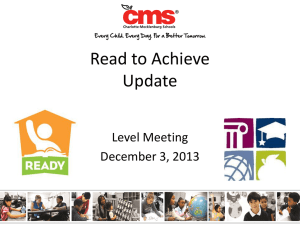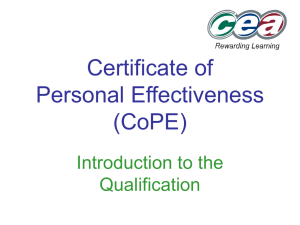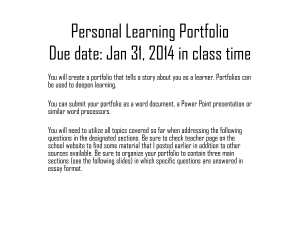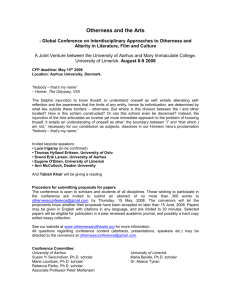Department of Educational Leadership
advertisement
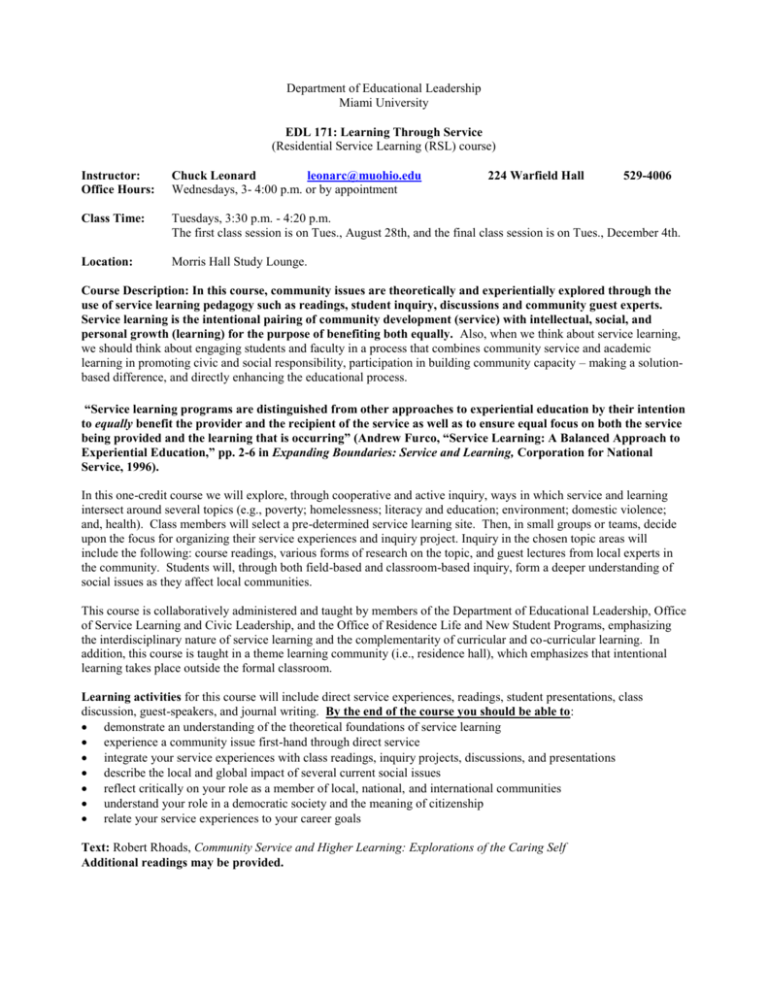
Department of Educational Leadership Miami University EDL 171: Learning Through Service (Residential Service Learning (RSL) course) Instructor: Office Hours: Chuck Leonard leonarc@muohio.edu Wednesdays, 3- 4:00 p.m. or by appointment 224 Warfield Hall 529-4006 Class Time: Tuesdays, 3:30 p.m. - 4:20 p.m. The first class session is on Tues., August 28th, and the final class session is on Tues., December 4th. Location: Morris Hall Study Lounge. Course Description: In this course, community issues are theoretically and experientially explored through the use of service learning pedagogy such as readings, student inquiry, discussions and community guest experts. Service learning is the intentional pairing of community development (service) with intellectual, social, and personal growth (learning) for the purpose of benefiting both equally. Also, when we think about service learning, we should think about engaging students and faculty in a process that combines community service and academic learning in promoting civic and social responsibility, participation in building community capacity – making a solutionbased difference, and directly enhancing the educational process. “Service learning programs are distinguished from other approaches to experiential education by their intention to equally benefit the provider and the recipient of the service as well as to ensure equal focus on both the service being provided and the learning that is occurring” (Andrew Furco, “Service Learning: A Balanced Approach to Experiential Education,” pp. 2-6 in Expanding Boundaries: Service and Learning, Corporation for National Service, 1996). In this one-credit course we will explore, through cooperative and active inquiry, ways in which service and learning intersect around several topics (e.g., poverty; homelessness; literacy and education; environment; domestic violence; and, health). Class members will select a pre-determined service learning site. Then, in small groups or teams, decide upon the focus for organizing their service experiences and inquiry project. Inquiry in the chosen topic areas will include the following: course readings, various forms of research on the topic, and guest lectures from local experts in the community. Students will, through both field-based and classroom-based inquiry, form a deeper understanding of social issues as they affect local communities. This course is collaboratively administered and taught by members of the Department of Educational Leadership, Office of Service Learning and Civic Leadership, and the Office of Residence Life and New Student Programs, emphasizing the interdisciplinary nature of service learning and the complementarity of curricular and co-curricular learning. In addition, this course is taught in a theme learning community (i.e., residence hall), which emphasizes that intentional learning takes place outside the formal classroom. Learning activities for this course will include direct service experiences, readings, student presentations, class discussion, guest-speakers, and journal writing. By the end of the course you should be able to: demonstrate an understanding of the theoretical foundations of service learning experience a community issue first-hand through direct service integrate your service experiences with class readings, inquiry projects, discussions, and presentations describe the local and global impact of several current social issues reflect critically on your role as a member of local, national, and international communities understand your role in a democratic society and the meaning of citizenship relate your service experiences to your career goals Text: Robert Rhoads, Community Service and Higher Learning: Explorations of the Caring Self Additional readings may be provided. Class Schedule: 8/21 Week 1 No Class 8/28 Week 2 Introduction and Overview Welcome and instructor’s introduction Overview of course - Reasons for the course - Expectations (small groups) - Students will take responsibility for learning - What will make having taken the course worthwhile when it ends? Review of the syllabus Selection of service learning project along with requirements (including research techniques and paper format) Handouts: Wingspread Principles of Good Practice or Rhoads Principles and service learning pedagogy Assignment: Chapter 2: Culture and Identity, Personal Values (must incorporate Chapter 2 into assignment) Stimulating Reflective Questions: 9/4 Week 3 9/11 Week 4 Service Learning Group Project Groups assigned Clarify expectations and any questions/concerns about projects Provide contact information to group members No Class (Mon/Tue Switch) Personal Values Assignment All members will bring completed assignment to class. Each person’s name will be placed into “hat” and randomly drawn. Assignment: Chapter 5: Mutuality and Development of Action Plan Stimulating Reflective Questions: (with learning outcomes, dates, preliminary research plans and names of group members responsible for each area and service learning portfolio – sequence of what/when will be included) 9/18 Week 5 Personal Values Assignment (cont.) and Action Plan Personal Values Assignment sharing will continue Each group will share the “group portion” of its action plan and how it incorporates mutuality Assignment: Chapter 7: Action/Reflection and Journal Chapter 7 Stimulating Reflective Questions: Journaling can be a very powerful learning tool. Journals create a written record of progress — personal growth and changing perceptions — over the course of the term. They also provide an opportunity for written 2 dialogue between instructor and student. Most weeks there will be either an in-class or out-of-class journal entry/activity. Since we may share journal entries in class, come prepared to discuss your journal entries and to listen to others’. You will not be asked to share any journal entry that you do not feel comfortable sharing, unless it is specified in advance. For the assigned reflection journal, you should respond to at least one question in each of the following three categories: Description -- What? What are the main ideas/principles presented in this chapter? How do you feel about the reading? What strikes you as most interesting or significant about the reading? Interpretation -- So What? How does this reading challenge or reinforce what you already know or believe? What was most difficult for you about this reading? What did you learn? What personal challenges are there for you at your service site? Generalization/Application -- Now What? How does what you read relate to other things you’ve read or seen? How do the class readings relate or not relate to your service experiences? How might you integrate this reading into your group inquiry project or final paper for this course? 9/25 Week 6 SLCL Service Learning Model Model discussion, including PARE The value and practice of critical reflection Expanding upon ideas of Principles of Good Practice Discussion of Miami Leadership Commitment (MLC) Values (This class period should allow time for instructors to “catch up” or expand on any of the previous topics covered to date as this class is a discussion of the service learning pedagogy (theory) which has been slowly revealed to students over the first 5 weeks). Assignment: Chapter 4: Otherness (Instructor’s Option: Individuals schedule brief appointment with instructor regarding progress of sl portfolio within the next 2 weeks.) Stimulating Reflective Questions: 10/2 Week 7 The concept of “Otherness” and Diversity Directed writing using quote - Each instructor will choose a quote either from text or other source and student will write a brief analysis of the quotation in regards to its significance to concepts of “otherness” and diversity - Discuss analysis of in-class assignment in small groups - Students will elaborate on in-class assignment and discussion in service learning portfolio Assignment: Chapter 1: Situating the Self and Critical Incident Journal Stimulating Reflective Questions: Critical Incident Journal: Concisely written journal based on an incident/situation experienced at service learning site and its significance to you in relation to the way you interpreted the event Describe a significant event that occurred as part of the service experience. Why was it significant to you? What did you learn from this experience? 3 10/9 How will this incident influence your future behavior? The journal will be peer reviewed in class next week Week 8 Small Group Reflection Peer review exercise of critical incident journal (Instructors will engage students in discussion about their service learning project in regards to examining it from the “I” and “otherness” perspective.) Assignment: The Many Faces of Service Handout and Collect Examples Complete the Many Faces of Service – Part I & II handout Collect newspaper and magazine clippings that reflect the four types of service on a local, national, or international level and provide written captions identifying which type it is and why 10/16 Week 9 The 4 Types of Service The Many Faces of Service handout and sharing clipping assignment(small group activity). Then, each small group can choose a clipping to share with the large group. How does the student connect the service learning project to learning and impacting the community? Theory of service learning and its role in higher education Assignment dates of group presentations will be given Assignment: Review Action Plan and Read Hand Out Check-in with your group Update action plan and complete tasks to date, including service learning portfolio and working on group presentation Read Thomas Erlich’s article on Moral Learning Stimulating Reflective Questions: 10/23 Week 10 Democracy and Citizenship Connecting civic responsibility to service learning project and national/international community. Small group exercise where students are provided a variety of quotes and statements to choose from for discussion Required attendance at 3 campus wide events (1 of the three will be identified for you to attend) that addressed the topic of civic responsibility and/or democracy and write a 2-page essay on the significance to you and connecting it to classroom learning. Essay to be submitted this day. Assignment: Chapter 3: Thinking about Community and Chapter 6: Community Building Stimulating Reflective Questions: 10/30 Week 11 Transforming Communities Discussion about “community” Storyboard – students create an in-class story, which is posted on the pillars in Morris Hall during class and will be collected to be property of SLCL for future use (publications, website, etc.) Assignment: Chapter 8: Critical Community Service and Reflection Reflection assignment is to create an introspective Letter of Recommendation regarding your academic learning and staple a self-addressed business envelope (campus address) to the letter: 4 11/6 Include goals to achieve in 4 years at Miami University, including the significance of your presence in an academic institution and community. Does your academic learning include a holistic education as purported in a Liberal Education curriculum? Does holistic education mean linking academic learning to community action? How did you achieve those things described in the letter? Chapter 8 Stimulating Reflective Questions: Week 12 Critical Community Service Discussion and Group Presentation What role does higher education play in social change or community involvement? What impact did leadership play in life? How did you take on this role? Why is it important for students to take initiative and leadership in talking to faculty about service learning and connecting classroom knowledge with community issues? Service Learning Portfolio due (include sl group project – sl contract, photo essay, product of service; newspaper/magazine clippings related to topic area; annotated bibliography; integration of sl model and MLC Values; other items related to course readings/discussion; and, evaluation essay) Assignment: Finish Preparations for Group Presentation 11/13 Week 13 Group Presentations Evaluation form will be given to each student on which constructive, written feedback will be provided regarding the presentation 11/20 Week 14 Group Presentations Evaluation form will be given to each student on which constructive, written feedback will be provided regarding the presentation 11/27 Week 15 Group Presentations Evaluation form will be given to each student on which constructive, written feedback will be provided regarding the presentation 12/4 Week 16 Final Class Course evaluations Future opportunities in service learning and civic leadership Career opportunities 5 Assignments: Group Service Inquiry Project: Participation in service is a requirement of this course. During the second week of class, you will select a service learning project site from among those provided by your instructor. The class will organize itself into small groups or teams based on the service learning site, and will complete service hours as a group. Each team member will complete a minimum of one hour of service each week for a period of 8 weeks at the site. It is important to note that the service must be completed on a WEEKLY basis. The service will begin the week of September 10 and finish no earlier than the week of October 29. Your site supervisor must sign off on your hours. You will incorporate what you experience and learn from your service project into your service learning portfolio, class assignments and discussions, group presentation, and final paper. Consider service as a “text.” You will not be graded on your service participation per se but rather on how you integrate your service experience with your overall learning. Each team will, in conjunction with their service site experiences, engage in group inquiry around some aspect of their chosen topic. Each team will develop a presentation, interdisciplinary in nature, which will serve to inform the rest of the class on their chosen topic. Each team will formally present their inquiry project during class, which should be approximately 30 minutes long. Research sources may include: books, the Internet, journals, and popular media. The research should be interdisciplinary in nature. For example, you can look at HIV/AIDS from a sociological perspective, a health care perspective, a political perspective, and a psychological perspective. The best presentations will explore the topic from multiple points of view and multiple disciplines, utilizing current resources. An evaluation paper will be written in conjunction with the oral presentation. The paper will be handed in as part of the Service Learning Portfolio. Teams are strongly encouraged to: examine research data critically produce creative handouts for classmates use audio-visual media (VCR/TV, overheads, slides, etc.) – please inform instructors ahead of time to reserve A/V equipment engage the class in discussion by posing a question that relates to your topic engage the class in a learning activity--a short writing assignment or interactive exercise produce a bibliography for each class member on the topic produce a contact list of local nonprofit agencies that work with this topic Criteria for the presentations: clearly organized, with each group member making a contribution creativity of the presentation , use of varied sources from multiple perspectives breadth and depth of information gathered for the presentation demonstrated understanding of the topic being presented incorporation of service experience into the presentation Criteria for the Evaluation Paper: A self-assessment of how effective you met the learning and service objectives of the course Length of paper 4-5 pages 6 Service Learning Portfolio: The Service Learning Portfolio is a semester long assignment requiring weekly attendance. The Portfolio will be a collection and expression of your learning connected to the service learning site. The purpose of the Portfolio is to keep you critically reflecting upon your service learning experience and a way to document its meaning. All assignments returned to you throughout the semester should be included in the Portfolio with “additions” to the original document creating a more dynamic and complete document. The design of the Portfolio is to allow for creativity of expression; however, the following areas list required items or optional items as guidelines for the Portfolio: Required items: Service learning contract Action plan Weekly log of service activities Product of service (creating an agency brochure, advocacy letter, etc.) Annotated Bibliography Integration of service learning model and MLC Values Evaluation Paper Letter of Recommendation Reflection Journal Directed Writing assignment Critical Incident Journal Democracy and Civic Responsibility Essay Inquiry Group Presentation Outline Optional: Photo essay Newspaper/magazine clippings related to topic area Other items related to course readings/discussions Poems Journaling Items from service learning site Memorabilia Brochures Art Any other pertinent information important to your learning Personal Values: This activity is designed to give you an opportunity to explore and reflect on what you value. Consciously recognizing what you value is important because your values and beliefs guide how you make your decisions, what your priorities are and how you relate with others. This assignment will also serve as a team builder for the class, where we will be able to get to know one another better. The Personal Values assignment can be completed through the construction of a collage, a musical medley, a poem or other means. Please note that you are to read Chapter 2: Culture and Identity in preparing this assignment. 7 Class Attendance and Participation: This is an interactive, experiential course. This means that engaged, active participation is a key to learning. Attendance is expected and punctuality counts. Students are permitted one unexcused absence. Each additional unexcused absence will result in a one-tier reduction of the final letter grade (e.g., a final grade of an “A” will be decreased to an “A-”). Unexcused absences include, but are not limited to, general illness, doctor’s appointments, scheduling another appointment during class time, etc. Please come to class prepared – familiar with the assigned materials, willing to discuss ideas related to the readings and topics at hand, and willing to listen openly to the presentations and points of view of classmates and guest speakers. Grading Criteria: Each student will start this class with 100 points. If you perform equally well in each of the following category, you will retain a total of 100 points. If you do not complete assignments by the due dates or your participation is lacking due to unexcused class absence(s) or non-involvement in discussions and activities, points will decrease. Note: All written work must be typed in Times New Roman with a size of 10, 11, or 12 font. Margins on all four sides are not to exceed 1” and standard spacing is double. This structure for all written assignments will be strictly enforced, so if you need assistance in learning page set-up, please ask a peer or contact the Instructor immediately. Participation 15 points Action Plan 5 points Reflection Journal 5 points Directed Writing 5 points Critical Incident Journal 5 points The 4 Types of Service Clippings 5 points Democracy & Civic Responsibility Essay 10 points Letter of Recommendation @ Academic Learning 10 points Service Learning Portfolio 25 points Group Service Inquiry Project - Presentation 15 points TOTAL 94-100 89-93 86-88 81-85 78-80 75-77 100 points A AB+ B BC+ 72-74 69-71 66-68 63-65 60-62 0-59 C CD+ D DF For students who choose to take the course Credit/No Credit, all assignments, including service learning project and class attendance and participation, must be completed satisfactorily and on time in order to receive credit for the course. You must turn in the necessary paperwork indicating your decision to take the course Credit/No Credit by September 19th. “How wonderful it is that nobody need wait a single moment before starting to improve the world.” Anne Frank 8 A Brief Service Learning Bibliography Albert, G. (ed.) Service Learning Reader: Reflections and Perspectives on Service Alinsky, S. Rules for Radicals Ayers, G. & Ray, D. (eds.) Service-Learning: Listening to Different Voices Barber, B. An Aristocracy of Everyone: The Politics of Education and the Future of America Barber, B. & Battistoni, R. Education for Democracy Bellah, R. et al. Habits of the Heart: Individualism and Commitment in American Life Berkowitz, B. Local Heroes Coles, R. The Call of Service: A Witness to Idealism Delve, C.C. et al. Community Service as Values Education Dewey, J. Experience & Education Goodwyn, L. The Populist Moment (intro) Greenleaf, R. The Servant as Leader Hooks, b. Teaching to Transgress Kendall, J. et al. Combining Service & Learning: A Resource Book for Community and Public Service Kupiec, T. (ed.). Rethinking Tradition: Integrating Service with Academic Study on College Campuses Lappe, F. & DuBois, P. The Quickening of America: Rebuilding our Nation, Remaking our Lives Lissman, D. A Civil Society: Civil Literacy and Service-Learning Loeb, P. Generation at the Crossroads McKnight, J. The Careless Society: Community & Its Counterfeits Michigan Journal of Community Service Learning, J. Howard (ed.) Palmer, P. The Active Life Taylor, B. (ed.) Expanding Boundaries: Service and Learning Rhoads, R. Community Service and Higher Education: Explorations of the Caring Self Sigmon, R. et al Journey to Service-Learning: Experiences from Independent Liberal Arts Colleges and Universities Weisel, E. Sanctuary 9




